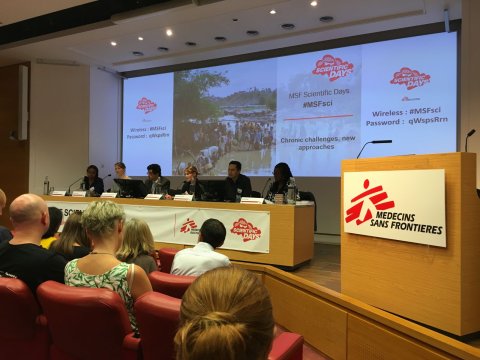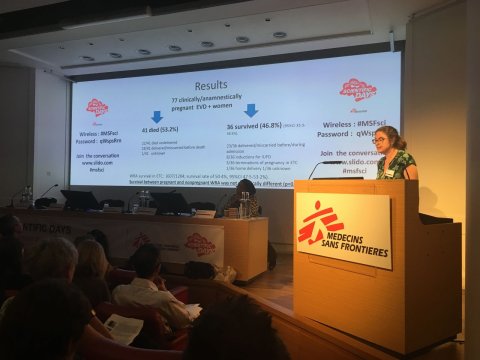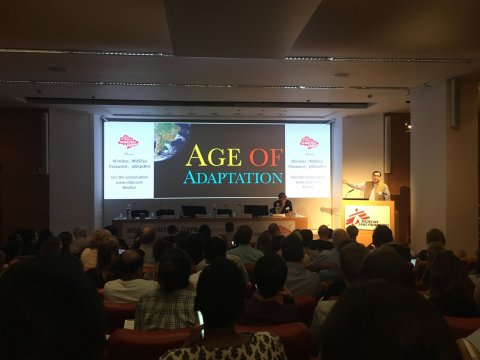MSF Scientific Days: sharing humanitarian research with global health community

We were very proud to be supporting MSF's Scientific Days, which took place on 24 and 25 May at the Royal Society of Medicine in London, for a fourth year.
The aim of the annual meeting is to share humanitarian research and innovation with the global healthcare community.
The day started with some introspection. Vickie Hawkins, Executive Director, MSF UK, acknowledged that all is not well in the humanitarian sector and said the key was to make everything people-focused, whether that be displaced populations, Rohingya refugees, female sex workers or people working in factories.
Research needs to be a radical act
Clair Mills, Medical Director of MSF France, then turned to research, asking: “how can we do better?”
She highlighted the importance of collaboration; that researchers should work with operational teams to agree on protocols, studies and topics and that research questions should be distilled using intersectional peer groups.
In summary, she said: “Research needs to be a radical political act that allows us to see change for our patients.”
Improving tuberculosis case findings in Malawian prisons
The first talk explained that prisons in Malawi remain a high risk setting for acquiring or developing TB.
The data presented showed that the implementation of systematic TB screening may have significantly improved TB case finding.
The next steps are to develop an operational toolkit for screening and make it available online. Equally important is advocacy work on overcrowding, food and living conditions, as well as early detection and prevention.
Successful implementation of HIV self-testing in rural Swaziland
Swaziland has the world’s highest HIV prevalence, at 27%. HIV care has been decentralised to primary healthcare providers and centres with MSF providing support in rural settings.
The study found that people’s overwhelming preference was to use the self-testing kit unassisted.
The conclusion was that self-testing is feasible in this rural setting and it has been adopted as an additional national testing strategy and is currently being scaled up.
Provision of PrEP in Mozambique for female sex workers and men who have sex with men
The uptake was very high and in a lot of cases it increases as communities get used to PrEP.
Despite the high demand, there are also high dropout rates due to changing residence, fear of stigma and some side effects.
The study was also limited by selection bias as participants were already MSF patients, so they were likely to be more health aware.
Integration of NCD care in DRC and Swaziland
This piece of research looked at two different aspects of NCDs; outpatient diabetes care in DRC and NCD care in outpatient and HIV services in Swaziland In DRC, they found that a third of population was underweight, as well as seeing a specific type of diabetes related to malnourishment.
It was very difficult doing trials in such insecure contexts, as people were not able to come to follow up appointments due to conflict and insecurity.
It was found that NCD care can be integrated into MSF-supported national services and it achieves acceptable intermediate clinical outcomes at a cost similar to HIV programmes.
Palliative care for patients with drug-resistant tuberculosis
The speaker explained that palliative care is essential in patients with drug-resistant tuberculosis in South Africa. Healthcare workers should prepare and administer palliative care for drug-resistant tuberculosis because it improves the quality of life for patients facing this life-threatening illness.
She went on to say that the place of palliative care should be alongside curative interventions and part of holistic care. At the least the principles and ethics of palliative care should be part of every curriculum for health care workers, which they are not at the moment.
Pregnancy and Ebola: survival of pregnant women with Ebola

In the 2014-2016 outbreak, the researchers looked at 77 cases of pregnant women with Ebola – 41 died and 36 survived. There were higher survival rates in the first trimester versus third trimester. This could be due to physiologically differences, as you’re more likely to bleed more in third trimester.
One silver lining was that they found baby Nubia, the ever first documented survivor of transplacental Ebola.
Recommendations from the research:
- There should be standard pregnancy testing at admission to Ebola treatment centres for all women of reproductive age.
- There should be a maternity space at Ebola treatment centres.
- Pregnant women with Ebola should deliver in a treatment centre.
Climate change, health and aid
The keynote speech on climate change, environmental health and humanitarian aid was given by Adil Najam, Professor of International Relations and Earth & Environment at Boston University. He started off by saying that we were never supposed to get to age of climate change adaptation. We are only here because we failed at mitigation.
Climate has become a humanitarian issue, as the imbalance of nature has led to the spread of vector-borne diseases, more drought, floods, food insecurity and natural disasters.
The crucial linkages between human, animal and environmental health are why the field of planetary health is one of RSTMH’s thematic priorities.
Talking about the environment and health, Anthony Costello, a global health professor at UCL, discussed flaviruses in Brazil. In the 1970s, they had almost all been eliminated, he said, but now yellow fever, chikungunya, Zika and dengue are all making a comeback, due to climate change and rising temperatures.
He went on to say that we’ve failed on the environment, but that people understand health and it’s a good angle to work on, especially if we can convey the fact that climate change will have an impact on people's children, not grandchildren.
Rohingya people in Bangladesh – using medical data to provoke political and social change

Then followed a very passionate talk on the situation of the Rohingya people in Bangladesh. Sid Wong, the Medical Director of MSF Operations Centre said: “there is nothing worse for those suffering than neglect and being ignored by global community.”
There are approximately 700,000 Rohingya refugees in Bangladesh now. They interviewed patients and caretakers and found that people had experienced violent deaths and widespread targeted violence.
In addition, they saw thousands of measles cases and diphtheria. They also treated survivors of gender-based violence, the youngest of which was nine-years-old.
This was a hugely sobering talk and a reminder that MSF are working in difficult situations long after the media has left.
Diphtheria outbreak
The next talk was related and looked at a diphtheria outbreak in Rohingya refugees in Bangladesh. It was a collaboration between MSF and LSHTM and was a real-time analysis of the outbreak.
In less than two months (November-December 2017), 2,624 cases were presented and, in one day alone, 168 diphtheria cases were reported (9 December 2017).
The forecasting techniques enabled real-time analysis of the course of the outbreak, but better understanding of epidemiological processes, disease characteristics and prior vaccination status would have allowed for clearer assumptions and more accurate predictions.
Striking the right balance
It was a great day!
“Often the mood in global health is self-congratulatory. We need to get the balance right between recognising the good things that are happening – vaccines, ART, etc. – and looking at the data and seeing everything that still needs doing", Professor David McCoy from Queen Mary University London.